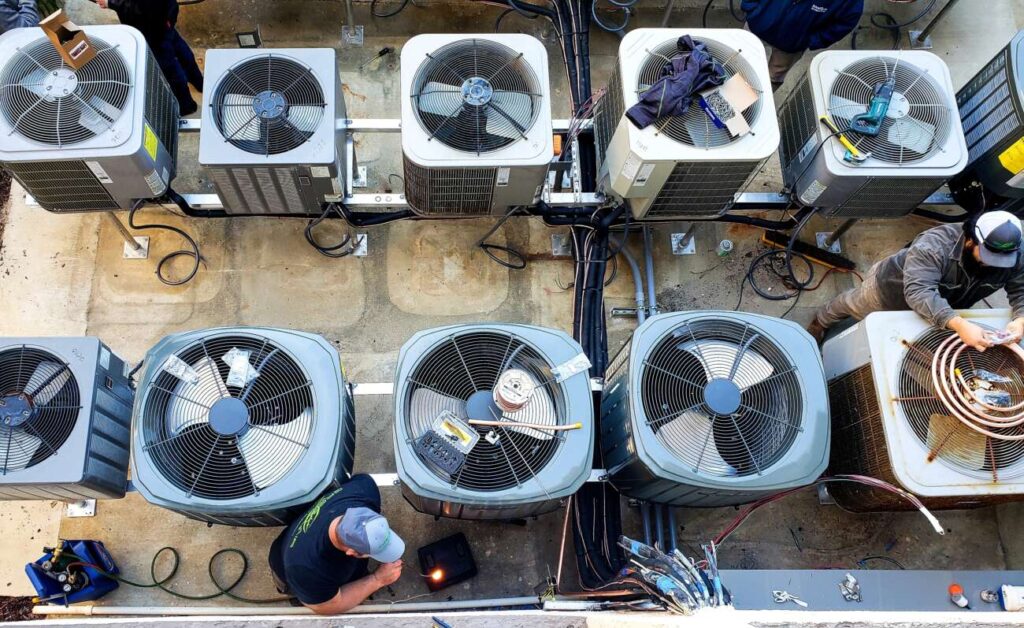Choosing the right HVAC system is essential for maintaining comfort, energy efficiency, and air quality in your home. HVAC, which stands for heating, ventilation, and air conditioning, is the system that controls indoor climate year-round. Whether you’re building a new home or upgrading an old unit, understanding your options and how to select the best system can save you money and improve your living environment.
Understanding Residential HVAC Systems
When selecting an HVAC system, it’s important to focus on residential HVAC systems designed specifically for home use. These systems vary widely in size, efficiency, and features. The goal is to find a system that meets your home’s heating and cooling demands without wasting energy or causing discomfort.
Residential HVAC systems typically consist of:
- A furnace or heat pump for heating
- An air conditioner or cooling unit
- Ventilation components such as ducts and fans
- A thermostat to regulate temperature
Knowing these components helps you evaluate different options and make an informed choice.
Key Factors to Consider in the HVAC Installation Process
The HVAC installation process is crucial because a poorly installed system can reduce efficiency and increase costs. When choosing your HVAC system, consider these key factors:
- Size and capacity: The system must be appropriately sized for your home’s square footage and layout. An oversized or undersized unit can lead to uneven temperatures and higher energy bills.
- Energy efficiency: Look for models with high SEER (Seasonal Energy Efficiency Ratio) and AFUE (Annual Fuel Utilization Efficiency) ratings. Energy-efficient HVAC solutions reduce utility costs and environmental impact.
- Fuel type: Options include electric, gas, or oil-powered systems. Your choice depends on availability, cost, and personal preference.
- Installation complexity: Some systems require ductwork, while others, like ductless mini-splits, offer flexible installation in homes without existing ducts.
- Maintenance requirements: Consider how easy it is to maintain the system and the availability of parts and service providers.
Consulting a professional early in the HVAC installation process helps ensure your system fits your home’s needs and budget.
Energy-Efficient HVAC Solutions to Save Money
Energy efficiency is a top priority for most homeowners selecting an HVAC system. Modern energy-efficient HVAC solutions not only reduce energy consumption but also improve comfort and lower maintenance costs. Features to look for include:
- High-efficiency compressors and motors
- Variable-speed blowers that adjust airflow for precise temperature control
- Smart thermostats that learn your schedule and optimize system operation
- Zoned heating and cooling to direct air where it’s needed most
Incorporating these features into your home can lead to significant savings on heating and cooling bills while reducing your carbon footprint.
HVAC Maintenance Tips to Keep Your System Running Smoothly
Once your system is installed, regular HVAC maintenance tips are vital to ensure long-term performance and reliability. Simple steps homeowners can take include:
- Changing air filters every 1-3 months to maintain airflow and air quality
- Keeping outdoor units clear of debris and vegetation
- Scheduling professional inspections and tune-ups annually
- Checking thermostat settings for accuracy
- Cleaning vents and registers to prevent blockages
These maintenance habits help prevent costly repairs and keep your system running efficiently throughout the year.
Troubleshooting Common HVAC System Problems
Even the best HVAC systems may encounter issues. Basic HVAC troubleshooting can help identify problems before they worsen. Common issues include:
- Uneven heating or cooling, often caused by dirty filters or duct leaks
- Strange noises, such as rattling or banging, indicate mechanical issues
- Frequent cycling on and off can signal thermostat or system problems
- Reduced airflow, typically due to clogged filters or blocked vents
When troubleshooting doesn’t resolve the problem, it’s wise to seek professional repair services to avoid further damage.
Differences Between Residential and Commercial HVAC Systems
It’s important to note that commercial HVAC systems differ significantly from residential ones. Commercial systems are larger, more complex, and designed for spaces like offices, retail stores, and industrial buildings. They often include additional features such as advanced filtration, humidity control, and centralized controls for multiple zones.
For homeowners, focusing on residential systems ensures you choose equipment suited for your space and comfort needs.
Importance of a Quality Air Conditioning System
The air conditioning component is crucial for comfort during hot months. An efficient air conditioning system cools your home effectively while using less energy. When selecting an AC unit, consider factors like SEER rating, noise levels, and compatibility with your existing heating system.
Modern AC units integrated with smart technology and energy-saving features can make a noticeable difference in home comfort and utility costs.
Final Thoughts
Selecting the right HVAC system for your home involves understanding your heating, ventilation, and air conditioning needs, evaluating energy efficiency, and planning the installation carefully. Regular maintenance and prompt troubleshooting further ensure your system runs efficiently and lasts longer.
By choosing the right system and caring for it properly, you can enjoy a comfortable home environment year-round while saving money on energy bills.
FAQs
- How do I know what size HVAC system my home needs?
A professional HVAC contractor performs a load calculation based on your home’s size, insulation, and climate to determine the correct system size. - What is the difference between a furnace and a heat pump?
A furnace uses fuel to generate heat, while a heat pump transfers heat between indoor and outdoor air, providing both heating and cooling efficiently. - How often should I have my HVAC system serviced?
Annual professional inspections are recommended, along with regular filter changes every 1-3 months. - Can I install an HVAC system myself?
Installation requires expertise to ensure safety and efficiency; it’s best to hire a licensed professional. - What are signs my HVAC system needs repair?
Reduced airflow, strange noises, uneven temperatures, and higher energy bills are common signs to schedule repairs.



